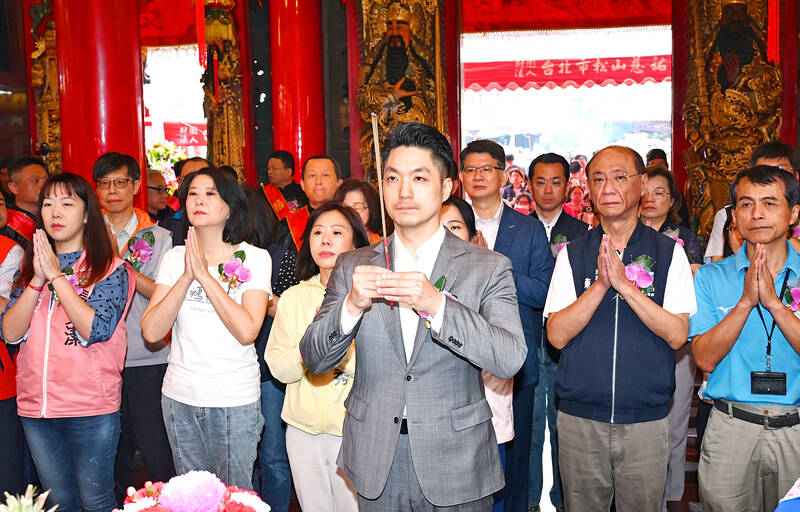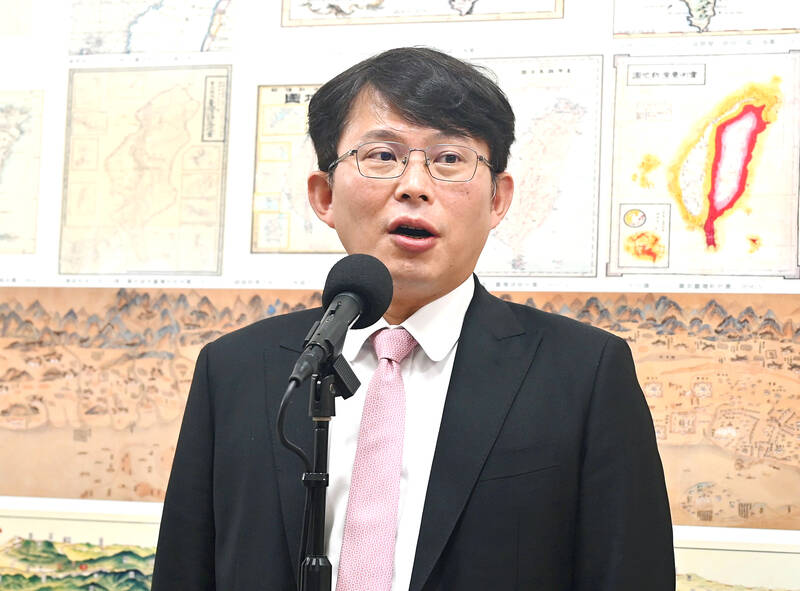Article 2 of the Additional Articles of the Constitution of the Republic of China (中華民國憲法增修條文) stipulates that upon a vote of no confidence in the premier, the president can dissolve the legislature within 10 days. If the legislature is dissolved, a new legislative election must be held within 60 days, and the legislators’ terms will then be reckoned from that election.
Two weeks ago Taipei Mayor Chiang Wan-an (蔣萬安) of the Chinese Nationalist Party (KMT) proposed that the legislature hold a vote of no confidence in the premier and dare the president to dissolve the legislature. The legislature is currently controlled by parties aligned with the People’s Republic of China (PRC), the KMT and the Taiwan People’s Party (TPP).
As of this writing, neither the TPP nor the KMT supports this proposal. The TPP under the leadership of Chairman Huang Kuo-chang (黃國昌), called for presidential elections to be held along with the legislative elections. TPP Legislator Chang Chi-kai (張?楷) said that if the legislature were dissolved, the executive would have a 60 day window with no legislative oversight.

Photo courtesy of Ker Chien-ming’s FB page
NO-CONFIDENCE VOTE
Why would the Taipei mayor suggest a no-confidence vote? He is not in the legislature, and will not lose his seat if the legislature is dissolved. By making a noise, he raises his own profile within the KMT, and positions himself for higher office. He also appeals directly to the KMT base. TVBS reported last week that “80 percent of blue camp members” support a no confidence vote. Chiang may also be speaking for elites who wish to remain anonymous.
Numerous observers have pointed out that the KMT’s unpopular policies means that it would lose a snap election — and control of the legislature. But despite the sentiment that the KMT, driven by some combination of arrogance and panic, has lost its collective mind, triggering a dissolution of the legislature might well be seen as a wise long-term move for the KMT.

Photo: Fang Pin-chao, Taipei Times
The debate over dissolving the legislature is backgrounded by the movement to recall KMT legislators. Although KMT propaganda has attempted to paint the mass recall of its legislators as a partisan move by the DPP, it is actually a project of civil society organizations angered by the KMT’s attacks on governance and the budget. It is increasingly effective. As of this writing, nearly a dozen recalls of KMT legislators have passed the second threshold, according to recent media reports, with many other notable KMT legislators close. As the recall gains momentum, its threat to the KMT grows.
This means that a recall election would likely deliver the legislature back to the DPP. In the legislative election last year, the DPP received more votes than any other party. The Lai Administration’s approval ratings are solid across most polls, and the DPP has the highest support among the major parties.
CRIPPLING THE TPP?

Photo: TT file photo
Elites in the KMT can see all this. No matter what choice they make, they likely lose. But if the legislature is dissolved, then the TPP, which competes with the KMT for the stagnant pool of blue votes, will take a huge hit. Could the KMT, by sacrificing its majority, which appears to be dead on arrival in any case, do severe damage to the TPP?
At present the eight TPP legislators are party-list legislators, not directly elected, seated based on the proportion of votes the party obtained in last year’s election (22 percent). A TVBS report from last week said that TPP internal polls show that its support is at 10 percent. In last year’s election the TPP received support from many longtime DPP voters frustrated with the DPP. Those voters will likely return to the DPP.
Further, government subsidies to parties are apportioned based on the number of votes. Hence, a reduction in the votes not only hits the party’s power, but sooner or later will reduce its flow of government funds.
The TPP could well be crippled by a 10 percent voter showing. It would become a rump party out of power, running on fumes and the high profile of its current leader, who is widely despised as an opportunist and demagogue. Large donations would cease as businessmen switched to other parties. Most of the TPP stalwarts are ex-Blues, and some would likely return to the KMT fold, as has already occurred with the People’s First Party (PFP). The KMT is thus looking at an opportunity to grievously harm an important competitor and lasso in its talent.
LOCAL FACTIONS
KMT elites may see this, but what about the local faction and clan politicians from local political machines? They might be persuaded to back a move to dissolve the legislature because winning legislators will be in office for an additional four years, enabling them to further cement their grip on local faction politics. Moreover, there would be some who could see this as a chance to eliminate the seats of machine opponents within the KMT, or elevate allies.
Against that is the cost. Politicians in safe seats may not need to spend large amounts, but the machine politicians have to splash around money to maintain their power. This urgent need may outweigh other concerns, which is why the KMT will likely reject Chiang’s proposal for a no-confidence vote. Further, the KMT could split over the spending issue, which will be very enjoyable to watch, but which augurs against KMT acceptance.
Ker Chien-ming (柯建銘), the DPP caucus leader, supported the idea last week, saying that dissolving the legislature would serve the same purpose as the recall. Generally premiers in Taiwan come and go leaving no permanent memory (quick, name three premiers of the previous president). Moreover, the DPP administration traditionally reshuffles the Cabinet a year or so before the next local election (next year). The DPP could easily go along with a no-confidence vote.
Another factor to consider is that the KMT and DPP have cooperated before to curb the power of smaller parties. The slashing of the legislature’s size two decades ago and the changes in the way legislative elections worked were partly intended to shrink the space for smaller parties to exist.
At this point it seems unlikely the KMT will lead a no-confidence vote. Meanwhile, the TPP, aware that it might not survive as a party if a new election is held, is against it.
One factor in the KMT decision is going to be the hope in the party that anti-US sentiment in Taiwan has risen after the Trump tariffs. The DPP, of course, is associated with the US.
This suggests that in the upcoming elections, whether for recalls or for a new legislature, Washington can intervene on the DPP’s behalf simply by giving Lai a win and slashing tariffs.
Notes from Central Taiwan is a column written by long-term resident Michael Turton, who provides incisive commentary informed by three decades of living in and writing about his adoptive country. The views expressed here are his own.

June 9 to June 15 A photo of two men riding trendy high-wheel Penny-Farthing bicycles past a Qing Dynasty gate aptly captures the essence of Taipei in 1897 — a newly colonized city on the cusp of great change. The Japanese began making significant modifications to the cityscape in 1899, tearing down Qing-era structures, widening boulevards and installing Western-style infrastructure and buildings. The photographer, Minosuke Imamura, only spent a year in Taiwan as a cartographer for the governor-general’s office, but he left behind a treasure trove of 130 images showing life at the onset of Japanese rule, spanning July 1897 to

In an interview posted online by United Daily News (UDN) on May 26, current Chinese Nationalist Party (KMT) Chairman Eric Chu (朱立倫) was asked about Taichung Mayor Lu Shiow-yen (盧秀燕) replacing him as party chair. Though not yet officially running, by the customs of Taiwan politics, Lu has been signalling she is both running for party chair and to be the party’s 2028 presidential candidate. She told an international media outlet that she was considering a run. She also gave a speech in Keelung on national priorities and foreign affairs. For details, see the May 23 edition of this column,

The Taiwan People’s Party (TPP) on May 18 held a rally in Taichung to mark the anniversary of President William Lai’s (賴清德) inauguration on May 20. The title of the rally could be loosely translated to “May 18 recall fraudulent goods” (518退貨ㄌㄨㄚˋ!). Unlike in English, where the terms are the same, “recall” (退貨) in this context refers to product recalls due to damaged, defective or fraudulent merchandise, not the political recalls (罷免) currently dominating the headlines. I attended the rally to determine if the impression was correct that the TPP under party Chairman Huang Kuo-Chang (黃國昌) had little of a

At Computex 2025, Nvidia CEO Jensen Huang (黃仁勳) urged the government to subsidize AI. “All schools in Taiwan must integrate AI into their curricula,” he declared. A few months earlier, he said, “If I were a student today, I’d immediately start using tools like ChatGPT, Gemini Pro and Grok to learn, write and accelerate my thinking.” Huang sees the AI-bullet train leaving the station. And as one of its drivers, he’s worried about youth not getting on board — bad for their careers, and bad for his workforce. As a semiconductor supply-chain powerhouse and AI hub wannabe, Taiwan is seeing